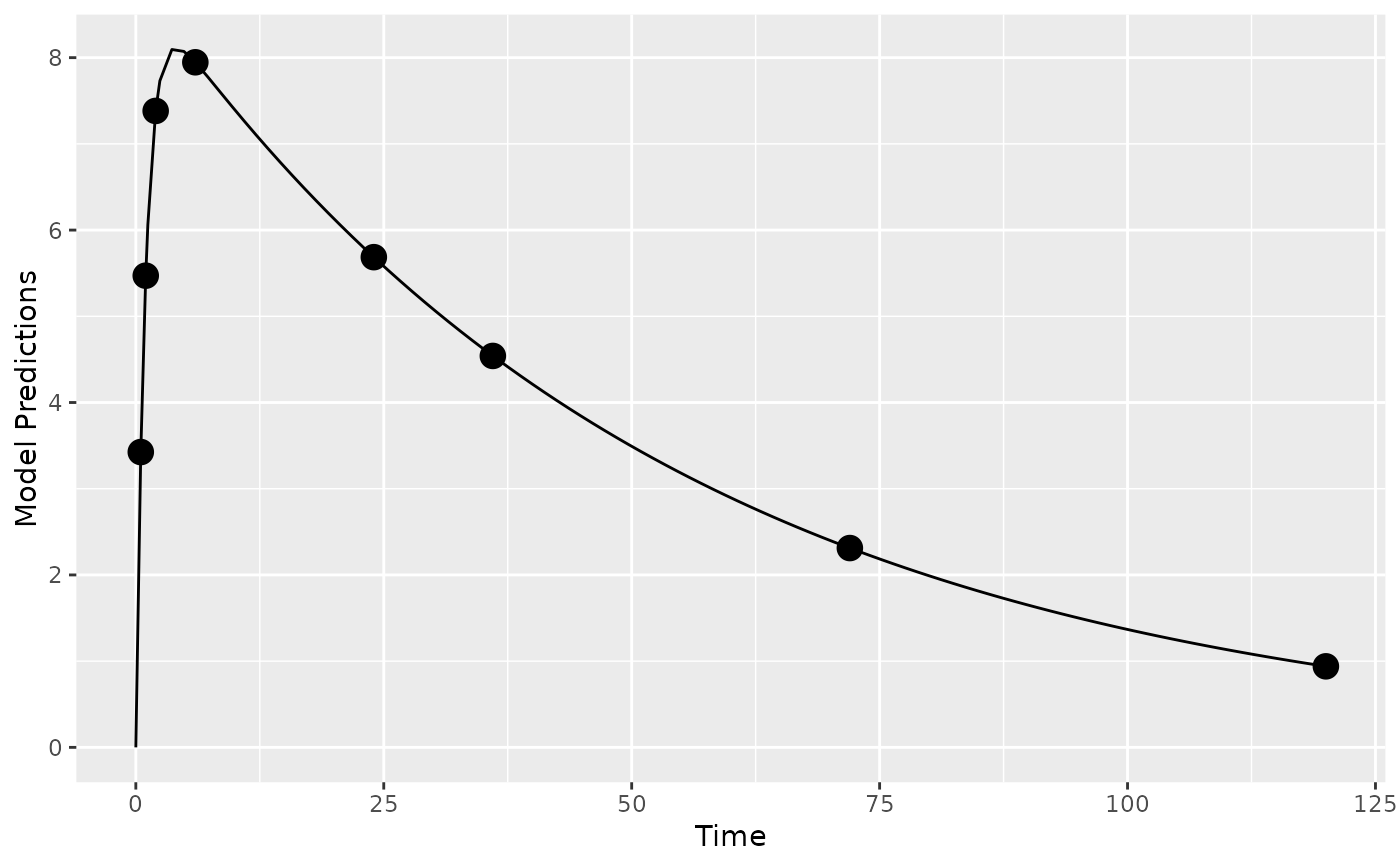
Structural model: one-compartment, oral absorption, single bolus dose, parameterized using KE.
Source:R/models.R
ff.PK.1.comp.oral.sd.KE.RdThis is a structural model function that encodes a model that is
one-compartment, oral absorption, single bolus dose, parameterized using KE.
The function is suitable for input to the create.poped.database function using the
ff_fun or ff_file argument.
Arguments
- model_switch
a vector of values, the same size as
xt, identifying which model response should be computed for the corresponding xt value. Used for multiple response models.- xt
a vector of independent variable values (often time).
- parameters
A named list of parameter values.
- poped.db
a poped database. This can be used to extract information that may be needed in the model file.
Value
A list consisting of:
y the values of the model at the specified points.
poped.db A (potentially modified) poped database.
See also
Other models:
feps.add(),
feps.add.prop(),
feps.prop(),
ff.PK.1.comp.oral.md.CL(),
ff.PK.1.comp.oral.md.KE(),
ff.PK.1.comp.oral.sd.CL(),
ff.PKPD.1.comp.oral.md.CL.imax(),
ff.PKPD.1.comp.sd.CL.emax()
Other structural_models:
ff.PK.1.comp.oral.md.CL(),
ff.PK.1.comp.oral.md.KE(),
ff.PK.1.comp.oral.sd.CL(),
ff.PKPD.1.comp.oral.md.CL.imax(),
ff.PKPD.1.comp.sd.CL.emax()
Examples
library(PopED)
## find the parameters that are needed to define from the structural model
ff.PK.1.comp.oral.sd.KE
#> function (model_switch, xt, parameters, poped.db)
#> {
#> with(as.list(parameters), {
#> y = xt
#> y = (DOSE * Favail * KA/(V * (KA - KE))) * (exp(-KE *
#> xt) - exp(-KA * xt))
#> return(list(y = y, poped.db = poped.db))
#> })
#> }
#> <bytecode: 0x55707d7bec00>
#> <environment: namespace:PopED>
## -- parameter definition function
## -- names match parameters in function ff
sfg <- function(x,a,bpop,b,bocc){
parameters=c(KE=bpop[1]*exp(b[1]),
V=bpop[2]*exp(b[2]),
KA=bpop[3]*exp(b[3]),
Favail=bpop[4],
DOSE=a[1])
return(parameters)
}
## -- Define initial design and design space
poped.db <- create.poped.database(ff_fun=ff.PK.1.comp.oral.sd.KE,
fg_fun=sfg,
fError_fun=feps.prop,
bpop=c(KE=0.15/8, V=8, KA=1.0, Favail=1),
notfixed_bpop=c(1,1,1,0),
d=c(KE=0.07, V=0.02, KA=0.6),
sigma=0.01,
groupsize=32,
xt=c( 0.5,1,2,6,24,36,72,120),
minxt=0,
maxxt=120,
a=70)
## create plot of model without variability
plot_model_prediction(poped.db)
 ## evaluate initial design
FIM <- evaluate.fim(poped.db)
FIM
#> [,1] [,2] [,3] [,4] [,5] [,6]
#> [1,] 1248651.3457 339.370439 144.758375 0.0000000 0.000000 0.0000000
#> [2,] 339.3704 20.724252 -1.777254 0.0000000 0.000000 0.0000000
#> [3,] 144.7584 -1.777254 51.742071 0.0000000 0.000000 0.0000000
#> [4,] 0.0000 0.000000 0.000000 3010.9773834 40.490260 0.1151092
#> [5,] 0.0000 0.000000 0.000000 40.4902598 27487.656006 3.1586320
#> [6,] 0.0000 0.000000 0.000000 0.1151092 3.158632 41.8319046
#> [7,] 0.0000 0.000000 0.000000 784.2206814 10869.344969 70.0662365
#> [,7]
#> [1,] 0.00000
#> [2,] 0.00000
#> [3,] 0.00000
#> [4,] 784.22068
#> [5,] 10869.34497
#> [6,] 70.06624
#> [7,] 807063.71904
det(FIM)
#> [1] 3.690649e+24
get_rse(FIM,poped.db)
#> KE V KA d_KE d_V d_KA SIGMA[1,1]
#> 4.784638 2.756206 13.925829 26.037875 30.238758 25.770773 11.163214
## evaluate initial design
FIM <- evaluate.fim(poped.db)
FIM
#> [,1] [,2] [,3] [,4] [,5] [,6]
#> [1,] 1248651.3457 339.370439 144.758375 0.0000000 0.000000 0.0000000
#> [2,] 339.3704 20.724252 -1.777254 0.0000000 0.000000 0.0000000
#> [3,] 144.7584 -1.777254 51.742071 0.0000000 0.000000 0.0000000
#> [4,] 0.0000 0.000000 0.000000 3010.9773834 40.490260 0.1151092
#> [5,] 0.0000 0.000000 0.000000 40.4902598 27487.656006 3.1586320
#> [6,] 0.0000 0.000000 0.000000 0.1151092 3.158632 41.8319046
#> [7,] 0.0000 0.000000 0.000000 784.2206814 10869.344969 70.0662365
#> [,7]
#> [1,] 0.00000
#> [2,] 0.00000
#> [3,] 0.00000
#> [4,] 784.22068
#> [5,] 10869.34497
#> [6,] 70.06624
#> [7,] 807063.71904
det(FIM)
#> [1] 3.690649e+24
get_rse(FIM,poped.db)
#> KE V KA d_KE d_V d_KA SIGMA[1,1]
#> 4.784638 2.756206 13.925829 26.037875 30.238758 25.770773 11.163214